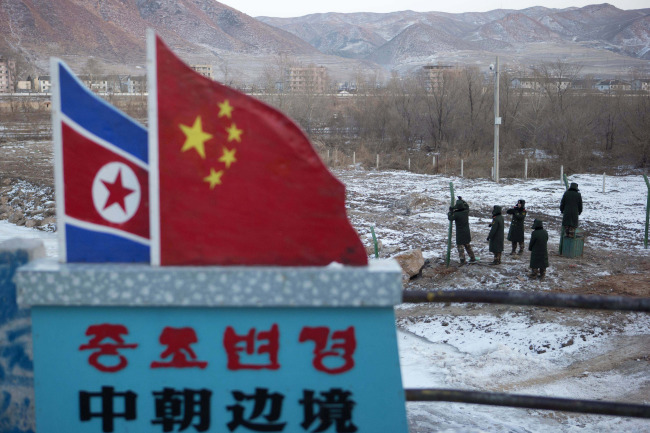HUNCHUN, China (AP) ― The warning came from Kim Jong Un, the North Korean ruler who sees his isolated nation, just across the border from this busy Chinese trading town, as under siege. The attack, he said, must be stopped.
“We must extend the fight against the enemy’s ideological and cultural infiltration,’’ Kim said in an October speech at the headquarters of his immensely powerful internal security service. Kim, who became North Korea’s supreme leader after the death of his father a year ago, called upon his vast security network to “ruthlessly crush those hostile elements.’’
Over the past year, Kim has intensified a border crackdown that has attempted to seal the once-porous 1,420-kilometer (880-mile) frontier with China, smugglers and analysts say, trying to hold back the onslaught.
“We must extend the fight against the enemy’s ideological and cultural infiltration,’’ Kim said in an October speech at the headquarters of his immensely powerful internal security service. Kim, who became North Korea’s supreme leader after the death of his father a year ago, called upon his vast security network to “ruthlessly crush those hostile elements.’’
Over the past year, Kim has intensified a border crackdown that has attempted to seal the once-porous 1,420-kilometer (880-mile) frontier with China, smugglers and analysts say, trying to hold back the onslaught.

The assault that he fears? It’s being waged with cheap televisions rigged to receive foreign broadcasts, and with smuggled mobile phones that ― if you can get a Chinese signal along the border ―can call the outside world. Very often, it arrives in the form of wildly popular South Korean soap operas smuggled in on DVDs or computer thumb drives.
In North Korea, a country where international phone calls and Internet connections exist only for a tiny fraction of a tiny elite, and televisions and radios must be permanently preset to receive only state broadcasts, it’s Korean-language TV heartache they crave.
“South Korean dramas, that’s what everyone wants,’’ grumbled a Seoul-based Christian missionary who runs a string of safe houses in this part of China, where his network helps people living underground after fleeing North Korea. One safe house is reserved for traders who sell everything from electronics to shoes inside North Korea ― and who smuggle everything from Bibles to soap operas on the side. He spoke on condition of anonymity to protect the safety of his network.
There’s “Autumn in My Heart,’’ a 12-year-old tear-jerker replete with switched babies, forbidden love, and a comatose heroine. And “Stairway to Heaven,’’ an epic of more forbidden love, more switched identities, blindness, insanity, a brain tumor and an evil stepmother. Everywhere in the soaps, there are tales of unrequited love, conniving rivals and handsome young men who just don’t realize they’d find true love with the girl next door.
But if it looks absurd ― a Stalinist nation vowing to crush an assault of bad lighting and overacting ― the dilemma is deadly serious for Kim, who needs to find a way to modernize his country and its economy while holding onto absolute power.
Today, changing technologies, ambitious smugglers and well-funded critics of Pyongyang mean that everything from DVD melodramas to illegal Chinese cellphones to Korean-language radio news broadcasts funded by the U.S. government make their way into North Korea. Their presence exposes an ever-growing number of North Koreans to the outside world and threatens the underpinnings of the Kim regime.
Kim’s crackdown has been largely aimed at the border with China, long the route for much of the outside information making its way into North Korea, as well as for refugees trying to get out.
Entire border security units have been replaced inside North Korea, fences have been strengthened and punishments ramped up for anyone caught trying to get through, according to smugglers, analysts and Chinese with family ties across the border. Meanwhile, special security units have been formed to seek out any contraband information or technology that Pyongyang sees as a threat.
“There has definitely been a push to roll back the tide of the flow of information,’’ said Nat Kretchun, associate director of an international consulting group InterMedia, which released a report earlier this year about information flow into North Korea, based on surveys of hundreds of recent North Korean defectors. The study was commissioned by the U.S. State Department.
His conclusion: North Korea is increasingly anxious to keep information at bay, but has less ability to control it.
People are more willing to watch foreign movies and television programs, talk on illegal mobile phones and tell family and friends about what they are doing, he said.
“There is substantial demand’’ for things like South Korean movies and television programs, said Kretchun. “And there are intensely entrepreneurial smugglers who are more than willing to fulfill that demand.’’
-
Articles by Korea Herald




















![[Today’s K-pop] Le Sserafim garners 100m views with ‘Eve’ music video](http://res.heraldm.com/phpwas/restmb_idxmake.php?idx=642&simg=/content/image/2024/05/24/20240524050572_0.jpg&u=)